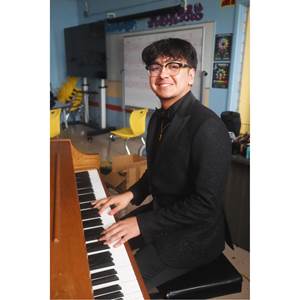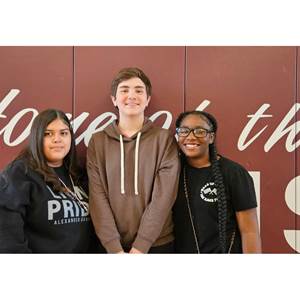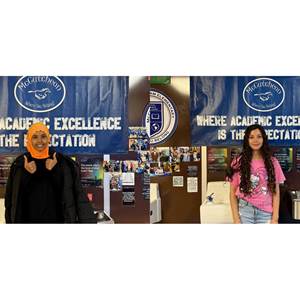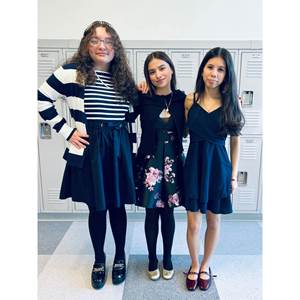Hitting the Right Note | Tocando la nota correcta
27 February 2020
The orchestra program at Hibbard Elementary is the perfect complement to classroom learning—bringing a positive impact to students in multiple ways.
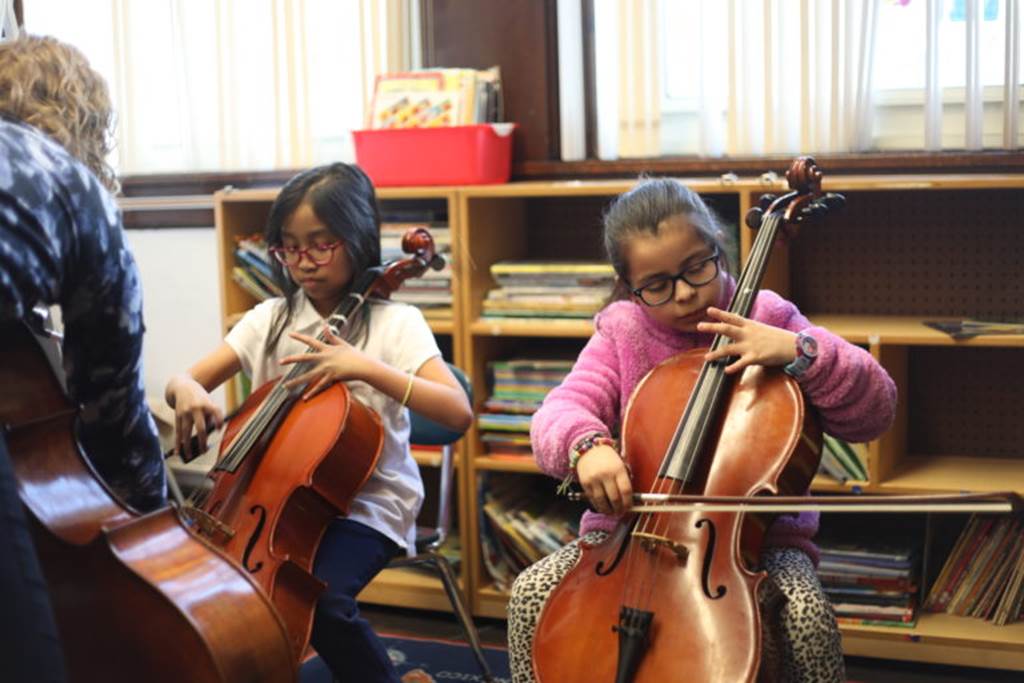
Expanding Student Opportunities through Community Partnerships at Hibbard Elementary
As they practice Legend of Dark Mountain for an upcoming concert, William G. Hibbard Elementary School second-grade students Isabella B. and Alexis P. always look for ways to help each other out. They’ve come to realize that mastering the cello—an instrument that is nearly as big as they are—is not going to happen overnight, but by diligently practicing together three days a week after school, they’re well on their way toward success and are having a lot of fun.
Hibbard Principal Scott Ahlman says that having a consistent, meaningful after-school extracurricular option for his students is the perfect complement to classroom learning, and he believes that being in an orchestra has a positive impact on students in multiple ways.
“Learning music helps open your mind and see things a little differently, but it also brings in the philosophy of teamwork and having a goal,” he said. “Participating in orchestra also helps with study habits because it teaches discipline and the importance of practice.”
Hibbard has been home to a student orchestra for the past 12 years. Under Principal Ahlman’s leadership, Hibbard was the first school in the district to partner with the People’s Music School to offer a free after-school orchestra program in 2008. Since then, the program at Hibbard has expanded from 30 students to 150 students.
Fifth-grade student Melissa R. was inspired to join the orchestra at first simply because she wanted to join her friends who were already part of it. She chose to play the viola because she was interested in playing an instrument that was not widely known. While Melissa was committed to playing her instrument from the very beginning, she was initially nervous about the daunting task of learning how to read music. However, since the program also has a music theory component, her fears quickly dissipated as she gained confidence as a musician.
“Learning how to read music started by memorizing my line notes and my space notes on the staff,” said Melissa. “It was hard at first but it gets easier as you practice.”
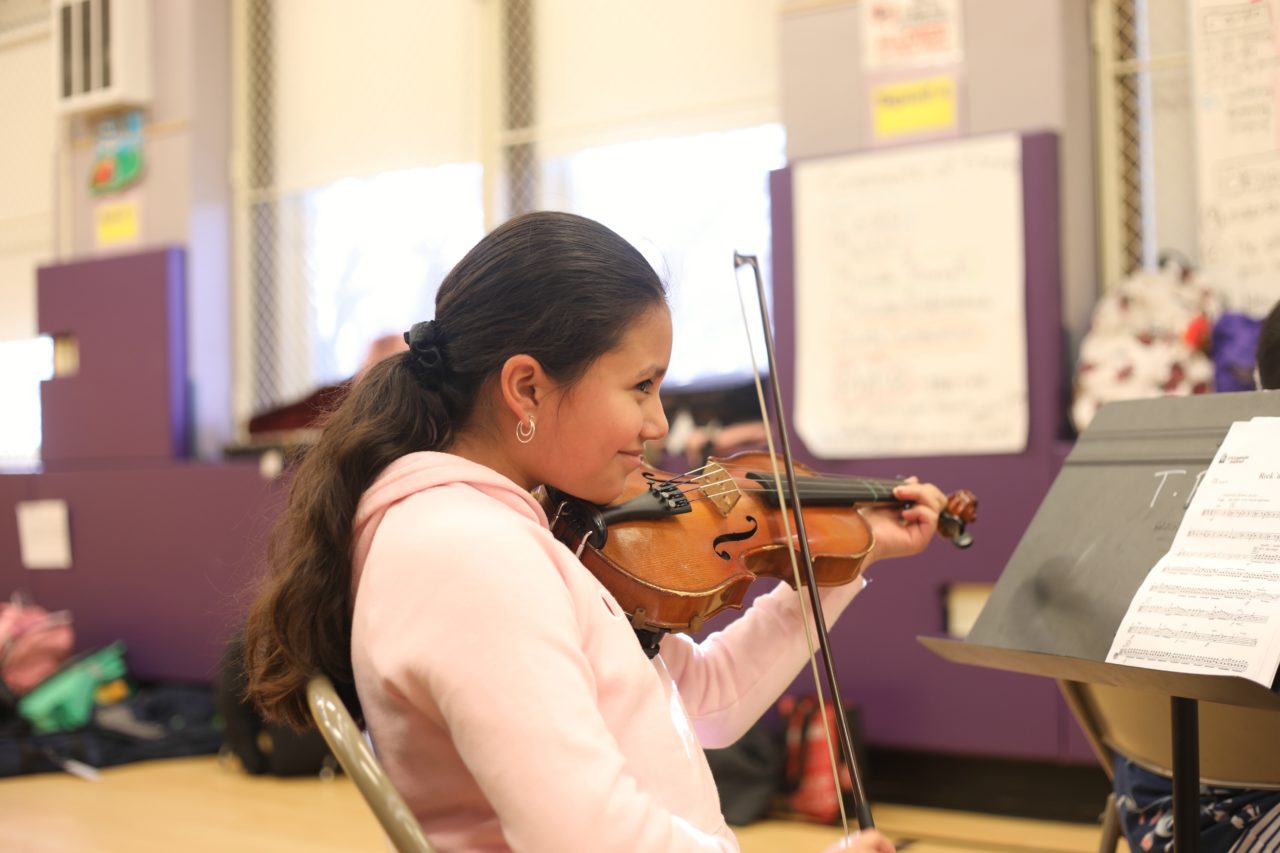
Hibbard Elementary Student Melissa R.
Isabella quickly learned that improving her technique on the cello would take time and lots of practice. As part of the program, students split up based on the type of instrument they play to create a collaborative environment while maintaining specialized instruction. Even though Isabella wanted to play her cello using the bow right away, her teacher taught her to first use only her fingers to learn the unique sound each string makes. After mastering the fundamental skills, she was able to use the bow even more effectively.
Beyond learning how to play the viola itself, Melissa says that joining the orchestra has taught her how to manage her time. Between her practices, homework, and other commitments, she says the best strategy to fitting everything in is to focus on the task at hand.
“[If you focus on what you are doing,] you can finish and then move on to the next thing,” she said. “Even if I’ve had a bad day, I look forward to orchestra because I get to express myself when I play my instrument.”
To top it off, the orchestra program allows students to not only build friendships with each other, but also to figure out exactly what they love about music. While Melissa has discovered that she prefers slower songs that she can ease into, Isabella likes faster songs because they’re more challenging. For both students, one of the best parts about playing an instrument is that they are always learning something new. Principal Ahlman says his students’ dedication is a core value he knows they will carry on beyond their time at Hibbard.
“Not only are my students learning music, the communal structure of the program allows them to build character and relationships with their instructors and with each other,” he said. “The program has been so successful that we’ve even had students receive full rides to college because of their dedication to their instruments.”
In a city full of noise, some of the best sounds are coming from Hibbard Elementary, where students are learning in the morning and making music in the afternoon.
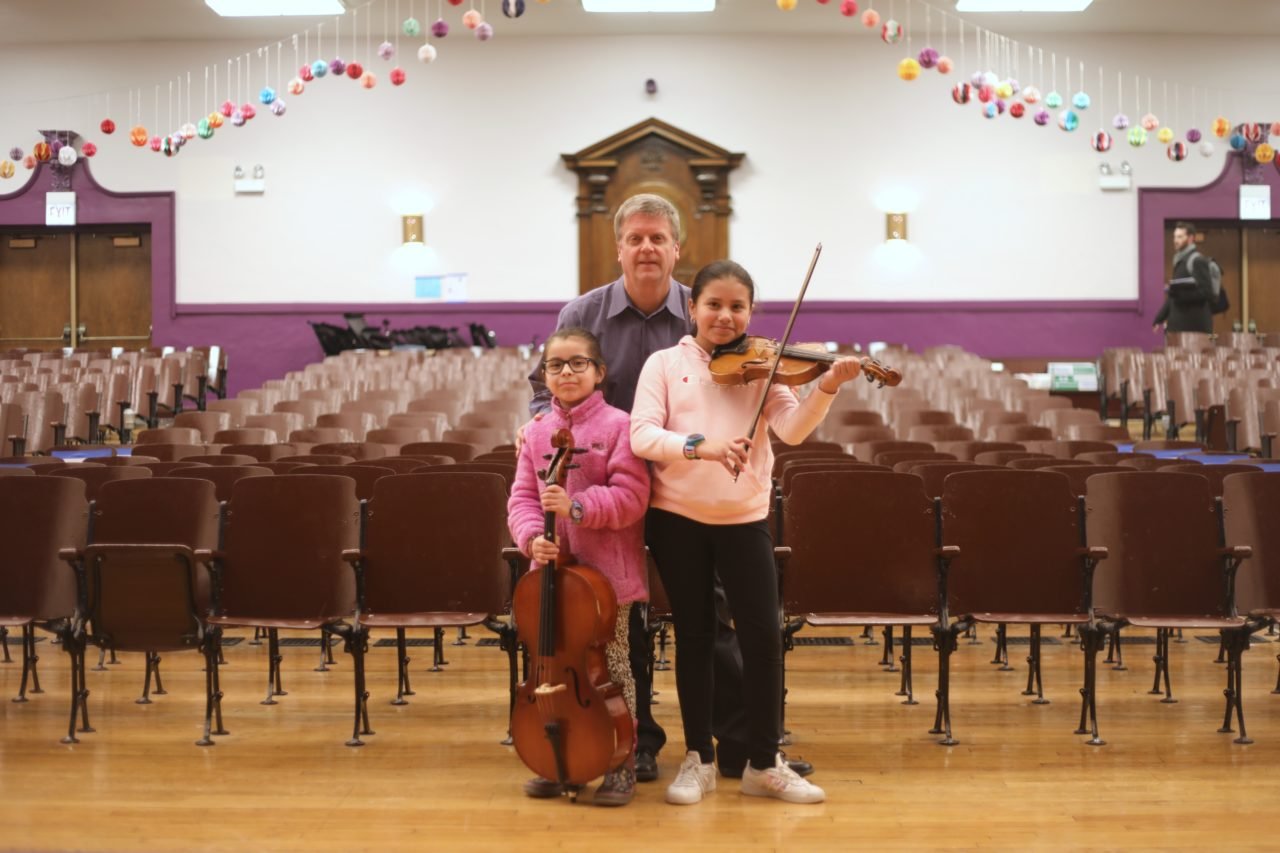
Expandiendo las oportunidades de los estudiantes a través de asociaciones comunitarias en la Escuela Primaria Hibbard
Mientras practican la obra Legend of Dark Mountain para el próximo concierto, Isabella B. y Alexis P., estudiantes de segundo grado de la escuela Hibbard, siempre buscan maneras de ayudarse mutuamente. Se han dado cuenta que dominar el violonchelo—un instrumento tan grande como ellos—no sucederá de la noche a la mañana. Pero van por el buen camino, ya que practican diligentemente tres días a la semana después de las clases, mientras se divierten juntos.
Scott Ahlman, director escolar, dice que ofrecerles a sus estudiantes un buen programa extracurricular de manera consistente es el complemento perfecto para el aprendizaje en el aula. También considera que formar parte de una orquesta beneficia positivamente a los estudiantes de diferentes maneras.
“Aprender música no solo nos ayuda a abrir la mente y a ver las cosas un poco diferente, también promueve la filosofía del trabajo en equipo y de tener una meta”, dijo. “Participar en una orquesta también ayuda a desarrollar hábitos de estudio porque enseña la disciplina y la importancia de la práctica”.
La escuela Hibbard ha sido la sede de una orquesta de estudiantes durante los últimos 12 años. Bajo el liderazgo de Ahlman, ésta fue la primera escuela del distrito en asociarse con la organización People’s Music School para ofrecer un programa de orquesta extraescolar gratuito en 2008. Desde entonces, el programa se ha expandido de 30 a 150 estudiantes.
Al principio, Melissa R., estudiante de quinto grado, se inspiró a unirse al club de orquesta simplemente porque sus amigos ya formaban parte de ella. Eligió tocar la viola porque le interesaba tocar un instrumento que no era muy conocido. Aunque desde el principio Melissa se comprometió a tocar este instrumento, le daba nervios la intimidante tarea de aprender a leer las notas musicales. Sin embargo, como el programa también cuenta con un componente de teoría musical, sus temores se disiparon rápidamente a medida que adquiría más confianza como música.
“Aprender a leer las notas musicales consistió en memorizar las notas sobre las líneas y los espacios en el pentagrama”, dijo. “Era difícil al principio pero se hacía más fácil a medida que practicaba”.
Isabella se dio cuenta rápidamente que mejorar su técnica en el violonchelo tomaría tiempo y mucha práctica. Como parte del programa, los estudiantes se dividen según el tipo de su instrumento para crear un entorno de colaboración, mientras se mantiene una instrucción especializada. Aunque Isabella quería tocar su violonchelo usando el arco inmediatamente, su maestro le enseñó a usar primero sólo sus dedos para aprender el sonido único que produce cada cuerda. Después de dominar las habilidades fundamentales, fue capaz de usar el arco de manera aún más eficaz.
Además de aprender a tocar la viola, Melissa dice que unirse al club de orquesta le ha enseñado a gestionar su tiempo. Entre sus prácticas, deberes y otros compromisos, dice que la mejor estrategia para incluir todas las actividades es enfocarse en la tarea en curso.
“[Si te enfocas en lo que estás haciendo], podrás terminarlo y luego pasar a la siguiente actividad”, dijo. “Aunque haya tenido un mal día, me animo a asistir al club de orquesta porque puedo expresarme cuando toco mi instrumento”.
Además, el programa de orquesta les permite a los estudiantes hacer amigos y averiguar exactamente qué es lo que les gusta de la música. Mientras que Melissa ha descubierto que prefiere canciones más lentas que le resulten fáciles, a Isabella le gustan las más rápidas porque son más complejas. Para ambas estudiantes, una de las mejores partes de tocar un instrumento es que siempre están aprendiendo algo nuevo. Ahlman dice que la dedicación de sus estudiantes es un valor fundamental que seguirán poseyendo después de graduarse de la escuela Hibbard.
“Mis estudiantes no sólo están aprendiendo música, el aspecto interactivo del programa les permite construir su carácter y crear las relaciones con sus instructores y compañeros”, dijo. “El programa ha tenido tanto éxito que incluso hemos tenido estudiantes que han ingresado a la universidad con becas completas gracias a su dedicación a la música”.
En una ciudad llena de ruido, algunos de los mejores sonidos provienen de la escuela Hibbard, donde los estudiantes aprenden por la mañana y hacen música por la tarde.
Related Stories
06 June 2025
How One Member of the CPS Class of 2025 Discovered His Passion for Music in High School
Gustavo has appreciated the individualized attention he received in high school.
06 June 2025
Meet Three Fantastic Members of the Graham Elementary School Class of 2025
Khloey, Michael, and London are each leaving behind an extremely positive legacy in elementary school.
03 June 2025
Spotlighting Two Remarkable Members of the McCutcheon Elementary School Class of 2025
Hawa and Samantha are known for their resilience and academic excellence.
02 June 2025
Getting to Know Three Sadlowski Class of 2025 Graduates
Yvanna, Itzaiana, and Jimena have been close friends since kindergarten, and each exhibits the qualities of an outstanding student and a remarkable leader.

